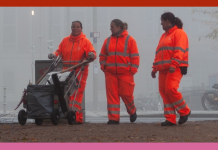Sarah Stranks, Health, Safety, Quality and Environment Manager at Thomson Environmental Consultants discusses the importance of good workplace mental health and how companies can ensure that staff are well supported through various initiatives
Although not always apparent, mental ill-health is a common problem, and the causes are complex and unique to each person. However, we know that, in addition to other causes, work can trigger or aggravate some of these issues.
According to the Mental Health Foundation 1 in 6.8 people experience mental health problems in the workplace (14.7%) and 12.7% of all sickness absence days in the UK can be attributed to mental health. As a responsible employer, we at Thomson take the mental health and wellbeing of our teams very seriously. Our workforce is diverse and, as an environmental consultancy, we have many people out of the office in all weathers at sites across the country and travelling long distances. It is important therefore to make sure that they feel supported and cared for in the workplace.
One of our most recent initiatives has been the introduction of mental health first aiders into the business. To date, seven staff from across Thomson’s four offices have been put through training with Mental Health First Aid (MHFA) England to become qualified mental health first aiders. The two-day course covers issues that people can face, helps the First Aiders to recognise the symptoms of potential mental health problems and looks at the best ways for people to work through and overcome them. MHFA have found that if people who are experiencing the early symptoms of mental ill-health feel able to talk about them – particularly in the workplace – it helps prevent the problem escalating into something more serious.
The inclusion of this role, within all geographical areas of the business and at different levels of seniority, has been very well received by staff. The launch of the scheme was done as part of our internal wellbeing programme and we made it clear from the outset that our trained MHFAs would be available to any staff member at short notice. A number of staff have made use of this service already and some have had reasonable adjustments made to their work duties to accommodate their individual needs. Others have been referred to more specialist services, as appropriate. Raising awareness of mental health issues and breaking down the barriers to accessing appropriate services can only be a positive move for any business.
Alongside this initiative, we believe that continual learning and education is another cornerstone of a happy workforce and research backs this up. The New Economics Foundation found that providing opportunities to develop new skills can create high levels of employee satisfaction. We provide a multitude of internal and external training courses to help our teams develop their skills and learn new ones – and hopefully, this helps them to enjoy their work and boost their job satisfaction too. It is important for us to have a skilled, well-trained workforce.
A lot of recent research has shown how important flexible working is for many people and it is often central to a happy workforce. Today’s employees place great emphasis on being able to balance work responsibilities around personal commitments. Flexible working can help ease the pressure of a range of issues including family commitments, study opportunities or simply work-life balance. By allowing your staff to work the hours they need to between the office and home, you as a business demonstrate trust and, in return, the obligation is that the work gets done on time.
Flexibility is important for us as an environmental consultancy because, as some of our work is seasonal, it allows us to scale our workforce up and down as required. Our clear flexible working policy is available to all employees. For example, our junior ecologists are often employed during our busiest period over the summer and then choose to go travelling during the winter months when the intensive field resource work tends to be quieter. They then pick up with us again the following season – an arrangement that works well for both parties and allows them the freedom to pursue their own life experiences if they want to.
A final point and it may seem obvious, but exercise is a well-known strategy for helping to reduce stress and aid mental wellbeing. If you exercise regularly, it can reduce your stress and symptoms of mental health conditions like depression and anxiety. Time away from your desk at some point in the day is important even if it’s just a walk around the block. Discounted gym memberships and organised outdoor adventures and activities are also great for encouraging staff to be sociable and making them more active and engaged with their work and colleagues.
For instance, we have groups that have tackled challenges such as the Yorkshire Three Peaks Challenge or taken part in beach cleans. In our Guildford office, we have a lunchtime tradition of a game of hacky sack. This outdoor team game involves passing a rice-filled hacky sack around the group with the objective of completing as many moves as possible, using no hands. This is inclusive of all departments in the business, helps de-stress by getting people outdoors, and can help improve working relationships and bonds in the workplace.
I have outlined just a few of the many workplace initiatives that can be implemented to support staff, keep them motivated and happy and ensure good mental health in the workplace. A happy workforce is key to a successful business and it is therefore important for us as employers to invest in our people.











